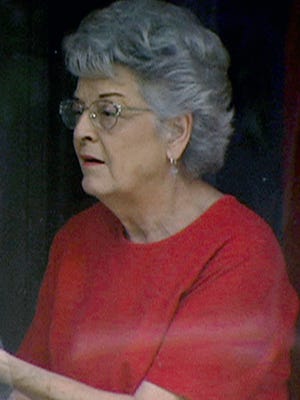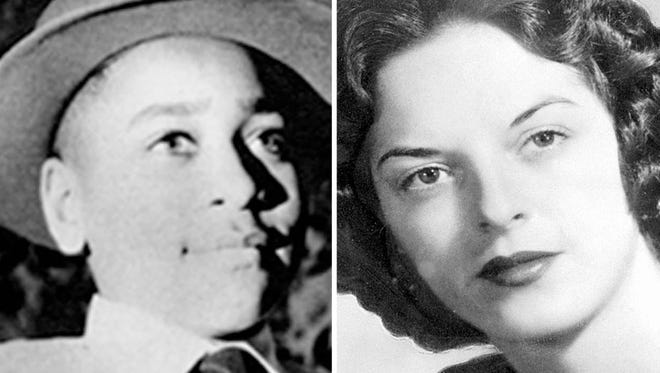Timothy Tyson’s book on Emmett Till became a bestseller thanks to the bombshell quote he attributed to Carolyn Bryant Donham — that she lied when she testified about Till accosting her.
The Latest:1955 warrant in Emmett Till case found, family seeks arrest
Donham’s daughter-in-law, Marsha Bryant, who was present for the two tape-recorded interviews Tyson did with Donham, said her mother-in-law “never recanted.”
Adding to the intrigue is the fact the quote Tyson attributed to Donham isn’t on the recordings.
Bryant said people unfortunately believe the 84-year-old played a role in Till’s murder when “she had nothing to do with it. They think she should die or go to jail forever. They think what happened to Emmett Till should happen to her.”
Donham’s then-husband, Roy Bryant, and his half-brother, J.W. Milam, on Aug. 28, 1955, grabbed Till from his great-uncle’s home, carried him away and killed him. Both men are now deceased.
Donham was “appalled” by Till’s murder and never wanted it to happen, Marsha Bryant said. Donham was not available for an interview.
In his book, “The Blood of Emmett Till,” Tyson wrote about Donham’s memoir recounting “the story she told at the trial using imagery from the classic Southern racist horror movie of the ‘Black Beast’ rapist. But about her testimony that Till had grabbed her around the waist and uttered obscenities, she now told me, ‘That part’s not true.’”
Related:Emmett Till case reinvestigated, but what does that really mean?

Tyson said the recordings of his interviews with Donham are now in the hands of the FBI, which is reexamining Till’s killing.
“It is true that that part is not on tape because I was setting up the tape recorder,” Tyson said.
He said when Donham began to mutter something about “they’re all dead now anyway,” he snatched up his notebook and began taking notes, which the FBI has since subpoenaed.
He shared a photo of the notes with the Clarion Ledger. They read: “That pt wasn’t true. … 50 yrs ago. I just don’t remember. … Nothing that boy ever did could justify what happened to him.”

Bryant said she feels Tyson acted “unethically” in dealing with the book she was writing with her mother-in-law, “More Than a Wolf Whistle: The Story of Carolyn Bryant Donham.”
“He had access to the book because he was my editor,” she said. “We allowed him to interview Carolyn, and he helped me edit.”
Tyson’s book, “The Blood of Emmett Till,” includes information from that memoir.

Tyson called Bryant’s claim that he was editor of the book “bullsh–.”
He said the family handed him about 30 pages and “persuaded me to leaf through this short, very flimsy, utterly unpublishable memoir. They asked for advice on how to get a memoir published, and I gave them some garden variety advice.”
He said he told them he didn’t want to be involved as an editor and didn’t line-edit the book.
Bryant said the family knew nothing about Tyson’s book until it was released, but Tyson said he told the family years ago he might do a book.
He said he promised the family to deliver the interviews and documents to the Southern Historical Collection at the University of North Carolina Chapel Hill library archives.
When he first mentioned this, Donham “seemed queasy about that,” he said.
But once he explained that the materials wouldn’t be available until her death, “that did satisfy her,” he said.
Bryant said the family never agreed to put the memoir into the archives.
According to Carly Miller, a spokeswoman for the collection, Tyson gave them an unpublished version of Carolyn Bryant Donham’s memoirs as an addition to the Timothy Tyson Papers, which contain his research materials.
“Mr. Tyson,” she said, “specified access restrictions to the papers: they were not to be released for 20 years or until the death of Ms. Donham.”
Tyson said he contacted Bryant about five years ago, asking if he could conduct another interview with Donham.
“She told me Carolyn wasn’t doing well and couldn’t talk to me,” he said.
He asked if she wanted his father, a pastor, to come by.
He quoted her as saying Donham became upset whenever she heard his name, explaining that “she’s afraid you’re going to write a book and ‘I’m going to be famous again.’”
He said he then told Bryant, “I’m working on a book, but I’m pretty sure she’ll not be with us when it’s published” because of Donham’s continuing poor health.
When the book did come out, Tyson heard from Bryant.
“She told me there were people on their front porch and pictures of their house on Internet,” Tyson said. “She was none too happy. She didn’t take exception to any of the facts.”
Bryant disagreed. “We told him the truth,” she said, “and he wrote she recanted.”
The idea that Donham would say those words to a stranger is ridiculous, Bryant said.
“Why would she recant to somebody she just met?”
Asked if the family is planning litigation, she replied no comment.
Related:Emmett Till’s cousin sets history straight

In 2007 a majority-black grand jury in Greenwood declined to indict Donham, considering charges ranging from manslaughter to accessory after the fact.
Despite the FBI’s current reexamination, those familiar with the case doubt there will be any prosecution.
Bryant said Donham has never wavered from the story she has told since 1955.
But her story has differed over the years.
In 1955, she shared with a defense lawyer for her husband and Milam that as soon as her husband Roy returned from a work trip, she told him what happened in the store with Till.
But she has repeatedly said since that someone else told Roy first.
“I didn’t say anything, and one of the reasons I didn’t ever say anything more about it, was because I was afraid that, what I was worried about was he’s gonna go find and beat him up,” she told FBI agent Dale Killinger.
Investigations by civil rights leader Dr. T.R.M. Howard and author Devery Anderson each concluded that Roy Bryant learned of what happened at the store from someone other than his wife.
In 1955, she took the witness stand to testify, and the judge concluded her testimony was inadmissible.
With the jury out, she told the courtroom and reporters present that Till grabbed her on the hips and told her that he had sex with white women before, using an obscenity.
Davis Houck, co-author of “Emmett Till and the Mississippi Press,” said if Donham is saying she didn’t recant in her interview with Tyson, “we’re left with a familiar story: a predatory black ‘man’ threatened to rape her on the evening of Aug. 24.”
He sees two problems with that:
- Her court testimony differs greatly from her initial statement, where she said Till grabbed her hand, asked for a date, said goodbye and whistled.
- When Till’s killers arrived at Mose Wright’s house, they asked for “the boy who did the talking at Money.” They didn’t ask for the one who touched Donham.
If she indeed recanted, he said, “we are, at long last, asked to see her as a pawn in the defense attorneys’ strategy.”
In the end, he said, Donham and Tyson “answer the same question: who was Emmett Till? Their very different answers continue to hang over the familiar, if mute, photographs of the Chicago child whose story has become a proxy for so many black boys and men in our present moment.”
Also Read:Just 35 days after being replaced, Emmett Till sign hit with bullets

